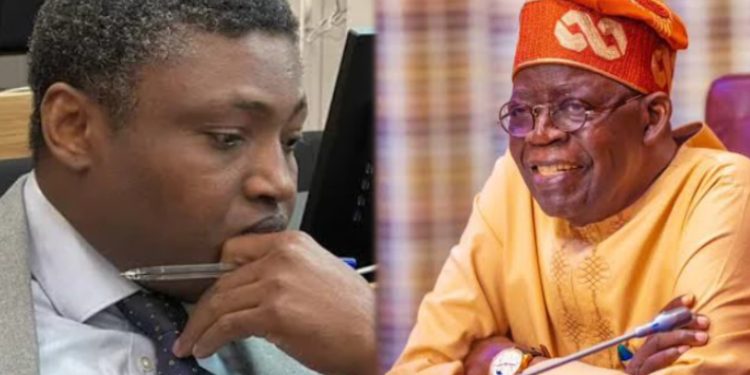Nigeria may repatriate Simon Ekpa after his six-year Finnish prison term for terrorism offences tied to Biafra separatist activities.
The Federal Government of Nigeria is weighing the option of repatriating Simon Ekpa, a Nigerian-born Finnish citizen, after his six-year prison sentence in Finland for terrorism-related offences. The move comes as President Bola Ahmed Tinubu’s administration intensifies efforts to tackle insecurity and separatist violence linked to the Biafra agitation.
Finnish Court Hands Down Six-Year Sentence
On Monday, the Päijät-Häme District Court in Finland sentenced 40-year-old Simon Ekpa to six years imprisonment after finding him guilty of terrorism-related crimes, aggravated tax fraud, incitement to commit crimes for terrorist purposes, and violations of the Lawyers Act.
The court also ordered that he remain in custody during the duration of his sentence. The ruling followed an extensive legal process that included 12 trial sessions between May 30 and June 25, 2025.
Ekpa, a former municipal politician in Lahti, Finland, was accused of playing a central role in separatist activities targeting Nigeria. The court said he used his social media influence to consolidate power within the Biafra movement, exploiting internal disputes to position himself as a key figure in the separatist campaign.
Ekpa’s Role in Biafra Agitation
Court documents revealed that between August 2021 and November 2024, Ekpa actively promoted the independence of southeastern Nigeria through unlawful means. Investigators found that he played a major role in organizing armed groups labeled as terrorist organizations.
ALSO READ: BREAKING: Dangote Refinery Surprises with First-Ever Crude Import from Ghana
Through an extensive online network, Ekpa was said to have facilitated the supply of weapons and explosives to these groups. He also incited his social media followers to commit violent crimes in Nigeria, leading to widespread insecurity in parts of the country.
Although he denied all charges, the court found overwhelming evidence against him. The unanimous verdict highlighted the seriousness of the offences, marking one of the most high-profile cases linking a Nigerian abroad to terrorism-related activities back home.
Nigeria’s Response to the Judgment
Reacting to the development, Nigeria’s Minister of Information and National Orientation, Mohammed Idris, confirmed that the government is reviewing options regarding Ekpa’s future.
“The Nigerian government will assess the situation and take decisions in the best interest of the country,” Idris said.
The Attorney-General of the Federation and Minister of Justice, Lateef Fagbemi (SAN), also welcomed the ruling, describing it as a demonstration of Finland’s cooperation with Nigeria in the fight against insecurity.
He noted that a possible repatriation request would be carefully considered after the government officially reviews the court’s judgment.
Possible Repatriation: What It Means for Nigeria
If repatriated, Simon Ekpa could face further legal proceedings in Nigeria, where authorities have long accused him of sponsoring violence and enforcing unlawful sit-at-home orders in the southeast. Security experts believe his presence in Nigeria could give law enforcement access to additional intelligence on separatist networks and their international funding channels.
For President Tinubu’s administration, Ekpa’s repatriation would signal a significant step in the broader effort to combat insecurity, restore peace in the southeast, and weaken separatist groups that have continued to destabilize the region.
Broader Implications for National Security
The case carries wider implications beyond Ekpa’s individual role. It underscores the challenges Nigeria faces in dealing with diaspora-based agitators who use digital platforms to incite violence from abroad.
Observers argue that Ekpa’s conviction in Finland sends a strong message about international cooperation in addressing transnational crimes and terrorism financing. It also reflects the growing recognition that separatist-linked violence in Nigeria is not just a local security issue but part of a broader global concern.
However, analysts caution that the Nigerian government must manage the process carefully to avoid inflaming tensions in the southeast, where calls for Biafra remain a sensitive issue. A balanced approach—combining security measures with dialogue—will be essential in ensuring that repatriation does not further polarize communities.
International Reactions and Diplomatic Cooperation
The Finnish government’s handling of Ekpa’s case has been welcomed by Nigerian officials, who view it as a sign of strengthened ties between both countries in tackling cross-border security threats.
Diplomatic sources suggest that Nigeria may seek broader agreements with Finland and other European nations to curb the use of social media platforms for extremist purposes. Such cooperation could also extend to monitoring illicit financial flows that sustain armed groups within Nigeria.
What Happens Next?
For now, Simon Ekpa remains in Finnish custody, serving his six-year sentence. Nigeria is expected to formally review the judgment before making any diplomatic or legal moves regarding his repatriation.
Legal experts note that any extradition or repatriation process would involve complex diplomatic negotiations, compliance with international law, and assurances regarding his trial and detention conditions in Nigeria.
Nonetheless, the case has already reignited debates on how best to deal with separatist movements, the role of diaspora agitators, and the balance between free speech and national security.
Conclusion
Simon Ekpa’s conviction and possible repatriation mark a defining moment in Nigeria’s fight against separatist violence. While his imprisonment in Finland deals a blow to pro-Biafra movements, his eventual return to Nigeria could reshape the government’s strategy in handling insecurity in the southeast.
As the Tinubu administration weighs its options, one thing is clear: the international spotlight is firmly on Nigeria’s next steps, and the outcome could set a precedent for how countries address transnational separatist threats in the digital age.


